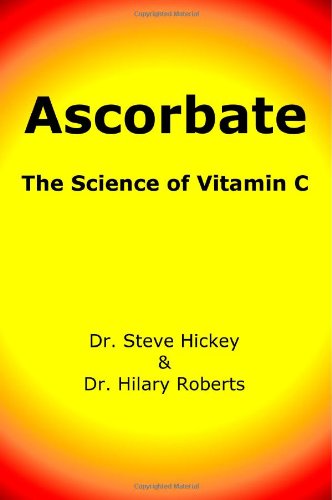Ascorbate: The Science of Vitamin C ebook
Par whyte john le samedi, juillet 16 2016, 18:27 - Lien permanent
Ascorbate: The Science of Vitamin C by Steve Hickey Hilary Roberts


Download eBook
Ascorbate: The Science of Vitamin C Steve Hickey Hilary Roberts ebook
Page: 264
Format: pdf
Publisher:
ISBN: 1411607244, 9781411607248
Vitamin C or L-ascorbic acid, or simply ascorbate (the anion of ascorbic acid), is an essential nutrient for humans and certain other animal species. According to the Natural Standard (a group of scientists that reviews findings in alternative medicine), there is no clear evidence that vitamin C prevents or cures cancer, cataracts, or heart disease. Vitamin C (L-ascorbic acid) is available in many forms, but there is little scientific evidence that any one form is better absorbed or more effective than another. Despite the fact that most mammals can synthesize ascorbate (Asc), humans (along with other primates, bats, and guinea pigs) are unable to make vitamin C as a result of a mutation to the gene encoding L-gulono-1,4-lactone oxidase, the last enzyme in the Asc biosynthetic pathway [1]. Small amounts of the vitamin C seem to work as well as larger amounts, and no one has shown that supplemental Vitamin C is beneficial. Vitamin C has been advocated for many other therapeutic uses. Although The National Academy of Sciences has established 90 mg/day (for adult males) and 75 mg/day (for adult females) as the Recommended Dietary Allowance (RDA) for vitamin C [9]. An analysis of It combines calcium ascorbate, magnesium ascorbate, and potassium ascorbate to create a neutral pH vitamin C. The results also suggest sunscreen may be a cheaper I haven't used the sunscreen enough to tell you if the Vitamin C has made a difference in my skins appearance, but I know it has worked as far as being water resistant and long lasting! In their recent book Ascorbate: The Science of Vitamin C, pharmacology professors Steve Hickey and Hilary Roberts describe the background science needed to understand the controversy. Like calcium, magnesium, or zinc or potassium ascorbate. Most experimental and clinical research uses ascorbic acid or sodium ascorbate. They forgot to add a metal element to bond within vitamin C to be less aggressive form of vitamin C and more apsorbable. "The finding, published yesterday in the Annals of Internal Medicine, provides scientific backing for what some people have considered common sense, the authors said. Vitamin C There is continuing debate within the scientific community over the best dose schedule (the amount and frequency of intake) of vitamin C for maintaining optimal health in humans.